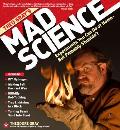How many children dying each year from school science experiments do you think is an acceptable number?
 I recently heard a radio report on the FDA's proposal to require treatment of raw oysters to prevent the roughly 13 deaths that occur every year from bacterial contamination. A number of people were perfectly happy to go on the radio and argue, in so many words, that these 13 people dying every year was not enough of a reason to require pasteurization of oysters, because hey, they just don't taste as good if they've been irradiated or heat treated.
I recently heard a radio report on the FDA's proposal to require treatment of raw oysters to prevent the roughly 13 deaths that occur every year from bacterial contamination. A number of people were perfectly happy to go on the radio and argue, in so many words, that these 13 people dying every year was not enough of a reason to require pasteurization of oysters, because hey, they just don't taste as good if they've been irradiated or heat treated.
Can you imagine someone going on the radio and arguing that it's OK for a dozen or so students to die every year in order to ensure that we have robust science education?
Far be it from me to be that person, but seriously, how do we reconcile this disparity? Do people really think a marginal improvement in the taste of raw shellfish is more important than the future of human civilization?
For the record, the actual number of students killed by science classes each year is pretty darn close to zero. It has happened in the last couple of decades, but very, very rarely. Even before the age of hyper-protectiveness, the fatality rate in science classes was a tiny fraction of that in, say, football practice, where death and permanent disability are comparatively routine. Yet laboratory science classes have been all but eliminated from schools, with safety being an oft-cited reason.
There are a number of ways to help understand why people might think it's OK to die for oysters but not for science.
People are well known to look at and evaluate risks in ways that make little sense in the cold light of reason. For example, if oysters were born pre-pasteurized and someone invented a process that would make them taste a bit better, but it killed 13 people a year, very few people (other than the French) would stand up to say that was a good idea.
And people are significantly more risk-averse when it comes to their children than they are about themselves. I know people who never wear seatbelts, but their babies ride in elaborate safety seats, properly strapped in.
Furthermore, people generally feel it's fine for adults to do risky things if they choose to. A dozen or two people die skiing every winter in Colorado, but that's not really considered a problem by anyone involved. There are special laws to protect the ski resorts from liability, and fatalities, while tragic, are generally rationalized as occurring when people aren't being careful, so it's their own fault.
So, clearly there is a significant difference between an adult choosing to eat a ticking oyster bomb, and a school assigning a child to do a required activity at school.
But all this is really not a good enough explanation. People take their children skiing all the time, knowing full well the risks. School football programs may be voluntary, but P.E. classes are generally required, and while they may not rise to the level of football in degree of roughness, they are certainly significantly more dangerous than social studies, or science.
I think the real key to the puzzle is fear of the unknown, combined with a general apathy about the value of science.
 When you understand a danger, you automatically feel more comfortable taking it on. Crashing into a tree at high speed is not difficult to understand, and therefore skiers accept the concept of trees dotting the slopes and work to avoid them. Avalanches, on the other hand, are mysterious to most people, so skiers fear them more than trees, even though far more are killed by trees than by avalanches.
When you understand a danger, you automatically feel more comfortable taking it on. Crashing into a tree at high speed is not difficult to understand, and therefore skiers accept the concept of trees dotting the slopes and work to avoid them. Avalanches, on the other hand, are mysterious to most people, so skiers fear them more than trees, even though far more are killed by trees than by avalanches.
Sadly, science is largely an unknown to a large portion of the population. Chemicals are things to be feared and despised. Say "acid" and people think bubbling vats of death, even if they just drank a healthy dose of citric acid for breakfast. It's really, really difficult to explain to someone why their child should spend a month playing with acids when that person's main conception of acids is formed by watching the way James Bond dispatches villains.
And when ignorance is combined with apathy, the conclusion seems all too obvious. Why take any risk at all, no matter how tiny, if you don't see the value of what you get for it? Skiing is fun. Football builds character and teamwork. Science gives you...what, exactly?
In tomorrow's post I will tell you why I think it's so important that science education be robust, including serious lab classes at the middle and high school level, and yes, I will defend those classes being no less dangerous than getting out of bed in the morning.